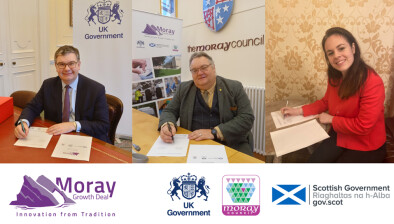Record North Sea revenues boost Scotland’s fiscal health

Scotland’s financial health has seen improvements in the past year, with particular emphasis on the country’s growing fiscal balance, revealed in the latest Government Expenditure and Revenue Scotland (GERS) figures)
A combination of record North Sea revenue, bolstered by the energy profits levy, and impressive growth in other financial avenues like income tax, national insurance contributions, and VAT have contributed to this fiscal upturn.
The net fiscal balance for 2022-23 showcased a deficit of 9.0% of GDP, amounting to £19.1 billion. However, if we exclude the North Sea’s contribution, the deficit widens to 15.1% of GDP (£28.5bn). Comparatively, the UK had a fiscal deficit of 5.2% of its GDP.
Delving deeper, Scotland’s public sector revenue was projected at £87.5bn, accounting for 8.6% of UK’s total revenue. The North Sea was a significant contributor with £9.4bn, a significant jump from the previous year’s £2.4bn.
Meanwhile, the non-North Sea revenue stood at £78.1bn, which is 7.7% of UK’s revenue, marking an 11.5% increase from the previous year. This increase was largely due to strong growth in income streams like national insurance contributions, VAT, and non-domestic rates.
On the expenditure front, Scotland’s public sector expenditure was £106.6bn, a £9.3bn rise from the previous year. The uptick was majorly due to increased payments in reserved public sector debt interest (which are inflation-linked) and the introduction of cost of living support.
Acknowledged the pivotal role of the North Sea revenues, Tracy Black, director, CBI Scotland, said: “Record North Sea revenues have provided a welcome uplift and showed the oil and gas sector’s continued importance to Scotland’s fiscal position.
“The ending of the Scottish Government’s COVID support for business through non-domestic rates, announced in late 2021, has also impacted on the overall balance sheet.”
Ms Black continued: “Higher public spending has been necessary to help households and businesses weather rising energy and other costs since the Ukraine conflict began, but much more work is needed to support growth in the private sector.
“Providing the right framework for businesses to thrive by attracting and training the best talent is vital. This can be achieved by removing planning constraints, particularly for renewables and making improvements to infrastructure and connectivity.
“The First Minister’s inaugural programme for government in a few weeks’ time will be crucial to building business confidence and sustainable growth which are key to Scotland’s economic success.”








